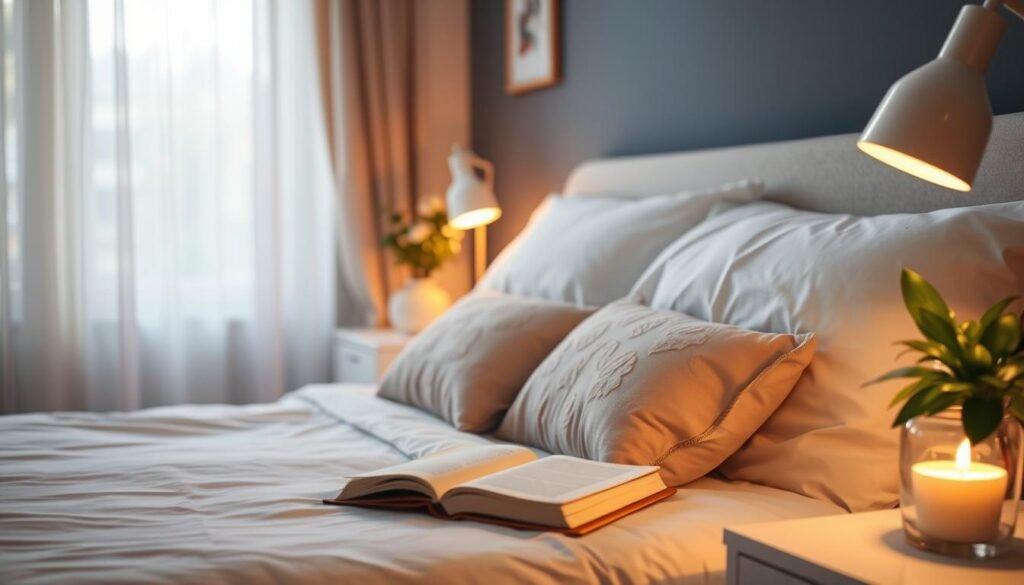Did you know 10-30% of adults struggle with insomnia? This sleep disorder becomes more common as we get older. Especially for older adults, the risk of facing sleep problems significantly increases. Understanding how to diagnose and treat insomnia in seniors is crucial. This is because it greatly impacts their quality of life and overall well-being.
The sleep pattern changes as we age, highlighting the need to find the reasons behind insomnia. There are effective treatments available. These range from cognitive behavioral therapy to changing daily habits. This guide explores how to diagnose and treat insomnia in the elderly. It aims to improve our grasp of sleep disorders in the elderly, focusing on better sleep. For more details, check out this comprehensive resource.
Key Takeaways
- Insomnia affects many seniors, underlining the need for good diagnosis and treatment.
- Healthcare providers have tools to identify both primary and secondary insomnia.
- Cognitive Behavioral Therapy effectively treats older adults’ insomnia.
- Making some lifestyle changes can deeply help seniors sleep better.
- It’s important for caregivers to know the challenges of treating sleep disorders in the elderly.
Understanding Senior Insomnia
Understanding senior insomnia means knowing the continuous sleep problems many older people have. It’s different from just having trouble sleeping now and then. Older adults with insomnia struggle to fall or stay asleep, even when they have the chance. They may feel very sleepy during the day, tired, moody, or have trouble thinking clearly. These issues can really affect their daily lives.
Definition and Symptoms
Senior insomnia messes with sleep in a way that makes the next day hard. People with this condition often find:
- Difficulty falling asleep or staying asleep
- Frequent awakenings during the night
- Daytime fatigue or sleepiness
- Mood swings or irritability
- Cognitive difficulties, such as trouble concentrating
Prevalence Among Older Adults
A lot of older adults, between 30% to 50%, deal with insomnia. Studies found that 43% of seniors aged 78 to 102 have insomnia symptoms at times. This shows why it’s important to carefully diagnose and understand insomnia in the elderly. It really affects their health and happiness.
Reasons for Increased Susceptibility
Several things make seniors more likely to get insomnia. Changes in sleep patterns because of age, health problems, and side effects from medicine are big reasons.
- Medical Conditions: Chronic illnesses often disrupt sleep quality.
- Medications: Certain prescriptions may lead to poor sleep patterns.
- Cognitive Decline: Mental health conditions, such as depression and anxiety, correlate with insomnia.
- Lifestyle Factors: Limited physical activity and social engagement can worsen sleep disturbances.
To help older adults with insomnia, we need a deep understanding of their unique situations. It’s crucial for healthcare providers to diagnose accurately and plan effective treatments.
The Impact of Insomnia on Seniors’ Health
Insomnia affects many older adults, leading to health problems. It’s important to understand physical consequences of sleep deprivation in seniors and mental health effects of insomnia. Also, how insomnia affects their daily lives. This understanding is key to helping them.
Physical Consequences of Sleep Deprivation
The physical consequences of sleep deprivation in seniors are serious. They include more than just feeling tired. For example, they face:
- Increased risk of cardiovascular diseases
- Higher chances of obesity
- Weakened immune system
These issues can worsen existing health problems. With many seniors experiencing insomnia, it’s crucial to address these effects.
Mental Health Effects
The mental health effects of insomnia include:
- Anxiety
- Depression
- Irritability
These can get worse, affecting seniors’ emotional well-being. Insomnia is linked with depression, especially in men. This shows the need for mental health support for those having sleep problems.
Impact on Daily Functioning
The impact of insomnia on daily functioning can make daily life hard. Seniors face issues like:
- Heightened fatigue
- Reduced cognitive performance
- Increased risk of accidents
- Diminished quality of life
Daytime tiredness makes tasks difficult for about 15.4% of seniors. Recognizing and addressing these issues is essential for their well-being.
| Health Impact | Percentage of Affected Seniors |
|---|---|
| Cardiovascular Diseases | Increased Risk |
| Obesity | Higher Chances |
| Weakened Immune System | Common Outcome |
| Anxiety and Depression | More Than 60% |
| Daytime Sleepiness | 15.4% |
| Increased Accidents | Heightened Risk |
How Healthcare Providers Diagnose and Treat Insomnia in Seniors
When diagnosing insomnia in seniors, doctors look at many things that could affect their sleep. They work hard to figure out the sleep issues of older adults. This includes spotting symptoms, understanding how long they’ve lasted, and seeing the effect on everyday life.
Diagnostic Criteria for Insomnia
The rules for diagnosing insomnia come from the International Classification of Sleep Disorders. If someone struggles to sleep well at least three nights a week for more than three months, it’s considered chronic insomnia. This helps doctors find the right treatment plans for older adults.
Common Diagnostic Tools and Methods
Doctors use many tools to check for insomnia:
- Physical exams to check for other health problems.
- Sleep diaries for tracking sleep habits and issues.
- Polysomnography, a detailed sleep study.
This process helps uncover the reasons behind insomnia in seniors. It could be health issues, daily habits, or even where they sleep.
Identifying Underlying Causes of Insomnia
Getting to the bottom of insomnia in the elderly is key. Often, medical or mental health issues play a big part in sleep problems. Finding out these reasons helps doctors create effective treatment plans. They need to know if insomnia is the main issue or a symptom of something else.
Cognitive Behavioral Therapy for Insomnia
Cognitive Behavioral Therapy for Insomnia (CBT-I) is a great way to treat insomnia, especially in seniors. It changes thoughts and actions related to sleep. This makes it a good choice instead of drugs for sleep problems in seniors. Many studies show CBT helps seniors sleep better and the results last a long time.
Overview of CBT Techniques
CBT-I uses different methods to tackle insomnia. It includes key parts like:
- Sleep Restriction: Limits time in bed to make sleep more effective.
- Stimulus Control Therapy: Helps link the bed with sleep by creating a regular sleep and wake schedule.
- Relaxation Strategies: Uses deep breathing, muscle relaxation, and guided imagery to lower sleep-related worries.
Many find big improvements with CBT-I. About 70% to 80% see better sleep. Experts often suggest 6-8 sessions for the best results.
Effectiveness of CBT in Seniors
CBT for seniors is proven to work well, making it the top choice for insomnia. The American College of Physicians supports using CBT-I to manage insomnia. This is because its benefits last a long time. While 5% to 10% of adults struggle with insomnia, non-drug treatments like CBT-I can greatly improve sleep and health in seniors.

Non-Drug Treatments for Senior Insomnia
Helping seniors beat insomnia involves using non-drug methods. Improving sleep hygiene, behavior, and using relaxation strategies are key. These methods can boost sleep quality and overall health, without the side effects of drugs.
Sleep Hygiene Practices
To sleep better, seniors should follow good sleep habits. Important steps include:
- Maintaining a consistent sleep schedule by going to bed and waking up at the same time each day.
- Creating a restful sleep environment that is dark, quiet, and cool.
- Avoiding stimulants like caffeine and nicotine, especially in the hours leading up to bedtime.
- Limiting alcohol intake, as it can disrupt sleep patterns.
- Engaging in regular physical activity to promote overall health and fatigue, which can aid in falling asleep.
Behavioral Interventions
Behavioral techniques like stimulus control therapy and sleep restriction improve sleep. These methods help seniors link their bed with sleep only. Avoiding other activities in bed strengthens this connection, supporting better sleep.
Relaxation Strategies
Relaxation techniques can lower pre-sleep anxiety. Options include:
- Progressive muscle relaxation, which involves tensing and relaxing muscle groups.
- Guided imagery, where one visualizes peaceful scenes to promote relaxation.
- Mindfulness meditation, which focuses on being present and accepting thoughts without judgment.
Using these strategies can calm the mind at bedtime. By focusing on improving sleep practices, behavior, and relaxation methods, seniors can enjoy better sleep. This leads to improved health.
Prescription Sleep Medications for the Elderly
Doctors often treat insomnia in the elderly with prescription sleep medications. There are many different types, each with its own pros and cons. It’s important for healthcare providers to pick the right one for every person.
Types of Medications Commonly Prescribed
Benzodiazepines, like lorazepam and clonazepam, are known for their calming effects. Sleep aids such as zolpidem and eszopiclone are also popular. They help with falling and staying asleep without some bad effects of benzodiazepines. These choices can really help seniors with insomnia.
Potential Risks and Side Effects
Even though these medicines can help, they have risks.
Potential risks and side effects of insomnia medications include getting addicted, needing more over time, and a greater chance of falling. For the elderly, these issues could lead to more health problems. That’s why doctors must watch their patients closely.
Guidance from Healthcare Providers
It’s key for doctors to keep an eye on their patients. They often mix medicine with other treatments. Using medicine along with healthy habits and therapy might work better. It could also mean less need for pills.

Managing Insomnia in Older Adults
Creating an ideal sleep space and a stable sleep routine is key for older adults. Many seniors struggle with sleep issues because of their unique needs. It’s important to adjust our approach to help them.
Creating a Healthy Sleep Environment
A restful sleep setting is vital for seniors. Important aspects include:
- Reducing Noise: Cutting down on outside noise helps seniors sleep better.
- Controlling Light: Keeping the room dark aids in signaling sleep time to the body. Brightness should be limited before bed.
- Comfortable Temperature: A cool room improves sleep quality.
By addressing these points, caregivers and seniors can create a place that supports good sleep.
Importance of Regular Sleep Schedule
Maintaining a consistent sleep schedule is crucial for seniors. Consistent sleep and wake times support the body’s natural clock. This assists in better nighttime sleep and more alert days.
A regular routine helps signal the body it’s time to relax. This enhances sleep quality and daily performance.
Following these steps can help reduce sleep problems in the elderly. To further improve sleep, exploring treatment options and resources is helpful. Websites like clinical guidelines offer useful details for handling insomnia in seniors effectively.
| Factor | Impact on Sleep |
|---|---|
| Noisy environment | Disrupts sleep continuity |
| Irregular sleep schedule | Impairs circadian rhythm |
| Exposure to light | Inhibits melatonin production |
| Comfortable bedding | Enhances sleep comfort |
Using these methods can greatly aid in tackling insomnia among older adults. This leads to better, more refreshing sleep.
Alternative Therapies for Insomnia
More people are looking beyond traditional medications for insomnia relief. They’re exploring natural ways to sleep better and relax more. Options like melatonin for older adults, acupuncture, and holistic practices are getting popular.
Melatonin and Herbal Supplements
Melatonin helps control when we sleep and wake up. For older people, taking melatonin can make falling asleep easier. But, figuring out the best amount to take is tricky. Herbs like valerian root are also being tested for sleep improvement. Yet, their safety and effectiveness need more review. It’s important to talk to a doctor before trying new supplements.
Acupuncture and Tai Chi
Acupuncture is showing promise for those struggling with sleep. It may make sleep better, but more studies are needed. Tai Chi combines slow movement and calmness, improving sleep in older people. Even a moderate amount of Tai Chi or some yoga can help with sleep problems. Doing these regularly helps with relaxation and overall happiness.

While these alternative therapies might look good, they can have risks. Understanding and weighing the side effects is crucial. If considering these options, discussing with a healthcare provider is wise. They’ll help with personal health issues or clashes with current treatments. For more in-depth info, here’s a helpful resource on managing insomnia.
| Therapy Type | Benefits | Considerations |
|---|---|---|
| Melatonin | May help in falling asleep faster and regulating sleep cycles | Optimal dosage poorly understood; consult a healthcare provider |
| Acupuncture | Can improve sleep quality | Further research needed to confirm effectiveness |
| Tai Chi/Yoga | Enhances relaxation and sleep quality | Benefits require consistent practice |
| Herbal Supplements | Provide natural options for improving sleep | Potential side effects; seek guidance from professionals |
Challenges in Treating Senior Insomnia
Treating senior insomnia involves unique challenges for healthcare workers. Various factors affect sleep, needing a personalized treatment approach. Also, medical conditions that coexist make planning treatments more complex.
Co-existing Medical Conditions
Many older adults have health issues that affect their sleep. Conditions such as depression, anxiety, and chronic diseases like arthritis add to the complexity. These can worsen insomnia, creating a cycle of bad sleep and health getting worse.
For instance, about half of people over 65 have sleep complaints. This shows how common these problems are among older adults.
Environmental Factors Affecting Sleep
Seniors’ sleep can be disrupted by things like noise, room temperature, and changes in lifestyle. These can mess with their natural sleep-wake cycle. For example, loud noises or uncomfortable beds can prevent good sleep, just like moving to a new home can cause unrest at night.
It’s important to understand all these challenges to manage insomnia in seniors well. By focusing on both medical and environmental issues, treatments can be more successful. For more information on sleep disorders, check out this guide.
Conclusion
Helping older adults with sleep problems is very important. Many seniors have trouble sleeping. This can affect their happiness and health over time. Insomnia is the most common issue they face. It can cause many problems.
Doctors are key in finding and treating sleep issues. They can identify symptoms that often go unnoticed. It’s important to look at sleep health early. Doctors use many methods to help, including good sleep habits and medicines when needed.
To manage sleep problems, we need to understand their causes. This understanding helps improve seniors’ health. Combining therapy, lifestyle changes, and medication works best. This mix helps seniors sleep better and live better. For extra help on what causes insomnia, check this resource.
In short, seniors face many health issues, including sleep problems. Understanding and dealing with these issues is key to their well-being. The aim is to improve sleep, leading to better health. Tailoring treatment to each person is important. This shows our deep commitment to making seniors’ health better.